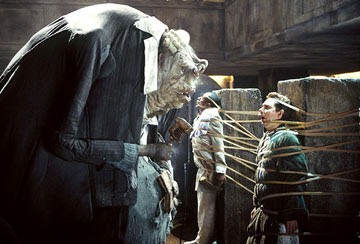The reveal of a new chapter in the elaborate "Star Wars" saga may seem commonplace in an age when special effects have been able to discover countless visionary movie worlds, but it is important to remember that the essence of our movie blockbusters today is partially owed to the ambition that set this franchise into motion all those years ago. When the first part of this story was unleashed in the mid-70s, it did more than just excite and marvel those who witnessed the spectacle; it literally awakened a new generation of dreamers, who saw cinema as more than just a tool for mimicking the foreground of our everyday lives. Here, at long last, movies were capable of exploring the universes that were nothing more than just figments in one's imagination on a grand scale. Limits were breached, walls were torn down, and gravity was eradicated from celluloid forever. Not a single person who saw the film could challenge its scope or its animal enthusiasm, and its legacy, further enriched by two equally satisfying follow-up chapters in the forthcoming years, was one that not only endured for future generations but in ways stayed relevant even amongst a slew of equally-ambitious endeavors that filled the theaters in the decades to come.
Thursday, May 19, 2005
Tuesday, May 10, 2005
Kingdom of Heaven / ** (2005)
Ridley Scott's latest excursion into the eras of old, a religious war epic called "Kingdom of Heaven," opens with a scene in which Godfrey (Liam Neeson), a knight from Jerusalem, returns to his home in France to reunite with the son he never knew. Young and quiet Balian (Orlando Bloom), on the other hand, doesn't seem very anxious for any kind of family reunion; recently scarred by the death of his newborn child and suicide of his wife, he passes days in a remote village making horseshoes and saying only what passers by require of him - usually nothing of significance. Godfrey's abrupt arrival might have at least seemed startling to such a hardened mourner, but for Balian it's just another revelation in a series of days he wants to be long over. Even when he accepts an offer from his new-found father to escape France and return to the Christian-ruled holy land, we never sense that he is doing it for the sake of understanding his father's desertion or for getting to know him in any capacity. At that stage in his life, the only thing that matters to him is change, and running away from the tragedies of his wife and child turns out to be motivation enough.
Friday, May 6, 2005
House of Wax / zero stars (2005)
"House of Wax" is such a vile and despicable heap of trash that I pity any lucid person who will actually pay decent money to sit through it. As a straight horror film, it supplies no legitimate horror other than the notion of sabotaging its source material in favor of visual repugnance, and as a remake of yet another famous 1950s scare-fest it completely squanders any chances it might have had of at least being amusing on the nostalgia scale. The people involved in making this thing should be ashamed of themselves; it is the kind of picture so revolting that it deserves to not only undermine careers but general reputation as well. A good manager might have pointed out that such a credit on a film resume might do a lot more damage than it's worth, but I guess you can't necessarily expect much sense from anyone who showed interest in the project to begin with.
Thursday, May 5, 2005
The Hitchhiker's Guide to the Galaxy / *** (2005)
The mentality of the average moviegoer is not one that is very receptive towards products that demand you to step into an alternate medium in order to acquire necessary background knowledge. This will surely be the primary dilemma facing many a casual viewer upon witnessing "The Hitchhiker's Guide to the Galaxy," the new film adaptation of the famous 1970s series of sci-fi comedy novels. Penned by a quirky and spontaneous over-achiever named Douglas Adams, the material is, I gather, a lot more detailed and informative than what the cinematic translation is willing to provide - here we get countless quips, quirks and moments of ingenuity that seem like they are referencing something much greater than what actually plays out. The narrative structure is painted in extremely broad strokes, occasionally punctuated by something satisfying, and most of the inevitable laughs come not from the fact that there's an effective punchline, but just for the fact that they are spontaneous and fall at an amusingly random pace.
Subscribe to:
Posts (Atom)




